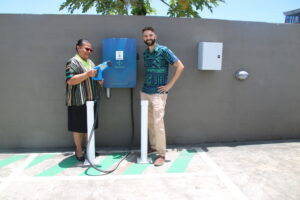- Home
- About FDB
- Product
- Small & Medium Business Loans
- Working Capital Loan
- Horticulture, Grains & Pulses Farming
- Livestock Farming
- Root Crops, Ginger, Vegetable & Fruit Farming
- Farm Development Loan
- Purchase of Farm Land
- Farm House Construction Loan
- Farm Land Sub-division Loan
- Farm Vehicles, Machinery, Implements & Equipment Loan
- Fishing Loans
- Sugar Cane Farming
- Broiler – Small Holder Chicken Farm
- Building Construction
- Commercial Property Loan
- Transport – Freight Purposes
- Commercial Loans
- Purchase of New Vehicles, Plant and Equipment
- Bus Loans
- Minibus Loans
- Taxi Loans
- Beef Farming Loans
- Coconut Farming Loans
- Dairy Farming Loans
- Agriculture Family Loan Facility – Grow As A Family
- Yaubula Term Deposit
- Climate & Eco-Finance
- FDB’s COVID-19 Affected Customer Relief Package
- Rice Mobility Package
- Small and Medium Enterprise Sustainability Package
- Ginger Loan Facility – Agriculture Value Chain
- FDB Loan for Women Entrepreneurs
- Sugarcane Farmers Special Loan Facility
- Locations
- Media
- Education & Feedback
- Home
- About FDB
- Product
- Small & Medium Business Loans
- Working Capital Loan
- Horticulture, Grains & Pulses Farming
- Livestock Farming
- Poultry Farming
- Root Crops, Ginger, Vegetable & Fruit Farming
- Farm Development Loan
- Purchase of Farm Land
- Farm House Construction Loan
- Farm Land Sub-division Loan
- Farm Vehicles, Machinery, Implements & Equipment Loan
- Coconut Farming Loans
- Dairy Farming Loans
- Agriculture Family Loan Facility – Grow As A Family
- Yaubula Term Deposit
- Climate & Eco-Finance
- Rice Mobility Package
- Small and Medium Enterprise Sustainability Package
- Ginger Loan Facility – Agriculture Value Chain
- FDB Loan for Women Entrepreneurs
- Sugarcane Farmers Special Loan Facility
- Dairy Farming Loan- Agriculture Value Chain
- Small & Medium Business Loans
- Working Capital Loan
- Horticulture, Grains & Pulses Farming
- Livestock Farming
- Root Crops, Ginger, Vegetable & Fruit Farming
- Farm Development Loan
- Purchase of Farm Land
- Farm House Construction Loan
- Farm Land Sub-division Loan
- Farm Vehicles, Machinery, Implements & Equipment Loan
- Fishing Loans
- Sugar Cane Farming
- Broiler – Small Holder Chicken Farm
- Building Construction
- Commercial Property Loan
- Transport – Freight Purposes
- Commercial Loans
- Purchase of New Vehicles, Plant and Equipment
- Bus Loans
- Minibus Loans
- Taxi Loans
- Beef Farming Loans
- Coconut Farming Loans
- Dairy Farming Loans
- Agriculture Family Loan Facility – Grow As A Family
- Yaubula Term Deposit
- Climate & Eco-Finance
- FDB’s COVID-19 Affected Customer Relief Package
- Rice Mobility Package
- Small and Medium Enterprise Sustainability Package
- Ginger Loan Facility – Agriculture Value Chain
- FDB Loan for Women Entrepreneurs
- Sugarcane Farmers Special Loan Facility
- Locations
- Media
- Education & Feedback
- Home
- About FDB
- Product
- Small & Medium Business Loans
- Working Capital Loan
- Horticulture, Grains & Pulses Farming
- Livestock Farming
- Poultry Farming
- Root Crops, Ginger, Vegetable & Fruit Farming
- Farm Development Loan
- Purchase of Farm Land
- Farm House Construction Loan
- Farm Land Sub-division Loan
- Farm Vehicles, Machinery, Implements & Equipment Loan
- Coconut Farming Loans
- Dairy Farming Loans
- Agriculture Family Loan Facility – Grow As A Family
- Yaubula Term Deposit
- Climate & Eco-Finance
- Rice Mobility Package
- Small and Medium Enterprise Sustainability Package
- Ginger Loan Facility – Agriculture Value Chain
- FDB Loan for Women Entrepreneurs
- Sugarcane Farmers Special Loan Facility
- Dairy Farming Loan- Agriculture Value Chain
- Small & Medium Business Loans
- Working Capital Loan
- Horticulture, Grains & Pulses Farming
- Livestock Farming
- Root Crops, Ginger, Vegetable & Fruit Farming
- Farm Development Loan
- Purchase of Farm Land
- Farm House Construction Loan
- Farm Land Sub-division Loan
- Farm Vehicles, Machinery, Implements & Equipment Loan
- Fishing Loans
- Sugar Cane Farming
- Broiler – Small Holder Chicken Farm
- Building Construction
- Commercial Property Loan
- Transport – Freight Purposes
- Commercial Loans
- Purchase of New Vehicles, Plant and Equipment
- Bus Loans
- Minibus Loans
- Taxi Loans
- Beef Farming Loans
- Coconut Farming Loans
- Dairy Farming Loans
- Agriculture Family Loan Facility – Grow As A Family
- Yaubula Term Deposit
- Climate & Eco-Finance
- FDB’s COVID-19 Affected Customer Relief Package
- Rice Mobility Package
- Small and Medium Enterprise Sustainability Package
- Ginger Loan Facility – Agriculture Value Chain
- FDB Loan for Women Entrepreneurs
- Sugarcane Farmers Special Loan Facility
- Locations
- Media
- Education & Feedback
FDB finances Fiji’s first-ever Electric Vehicle Charging Stations

FDB meets with Ministries to discuss collaboration opportunities
February 1, 2023
FDB partners with Tower to offer parametric insurance cover for the Women’s Loan facility
March 9, 2023In its efforts to promote sustainable transportation, the Fiji Development Bank (FDB) is now the leading financial institution to provide lending to introduce Electric Vehicle (EV) Charging Stations in Fiji.

Manager Climate & Eco-Finance at FDB, Ms. Setaita Tamanikaiyaroi with Founder and CEO of Leaf Capital Mr. Alex Reddaway at the EV charging station at Kundan Singh.
FDB is the lead funder for Leaf Capital Pte Limited’s EV charging stations at Kundan Singh and Mana Coffee. The charging stations use solar energy generated through the solar panels that will be mounted on the Kundan Singh and Mana Coffee building roofs.
Manager Climate & Eco-Finance at FDB, Ms. Setaita Tamanikaiyaroi said this lending and others in this space cements FDB’s commitment to contributing towards Fiji realizing its Nationally Determined Contributions as reflected under the Paris Agreement.
She said this is a start and FDB through its Climate & Eco Finance Strategy commits to financing electric vehicle infrastructure to pave the way towards decarbonizing Fiji’s land transport sector. To this end, Ms. Tamanikaiyaroi added that FDB is promoting electric vehicle financing that businesses can take advantage of.
Founder and CEO of Leaf Capital Mr. Alex Reddaway said their vision of creating a systematic change in the transport industry fits well with FDB’s commitment to reducing Fiji’s carbon footprint by lending to green projects.
“FDB is playing the catalyst role by providing the finance required to scale projects that will be essential if we are seriously looking to achieve the 1.5-degree target for global warming. It is commendable how the development bank has recognized the potential of e-mobility in Fiji and has been willing to take a risk on a startup promoting technology that is completely new to the region” said Mr. Reddaway.
“Through this project, we are encouraging people to switch away from fossil fuels and embrace renewable energy-focused transport – clean, cheap and good for the people and, often forgotten, fun to drive.”
“We are creating a transport ecosystem where renewable energy generated by the solar projects, we develop will completely offset the electricity used by the charging network. Smart charging allows us to align charging with times of surplus renewable generation so we can contribute to integrating renewables into the energy mix. We also have a variety of load-balancing techniques that can reduce the impact of charging on the grid. A final benefit is that, by shifting away from fossil fuels whose prices fluctuate in response to global events, we will be able to stabilize the costs of transport eliminating one element of uncertainty in people’s lives.”
Mr. Reddaway highlighted that he is looking forward to the launch of additional charging stations that have already been installed along the Coast and at RB Patel’s Jet Point in Nadi in the coming weeks, as well as announcing three new sites. The Nadi Suva route should be operational by the second quarter of this year and he hopes to have charging stations installed all around Viti Levu by the end of 2023 before expanding to Vanua Levu.
“It is an interesting project because everything we have created is completely modular and scalable. It can be applied to a small island like Rotuma but also allows us to expand to other countries in the Pacific. I look forward to FDB’s continued support on this journey!” he added.

